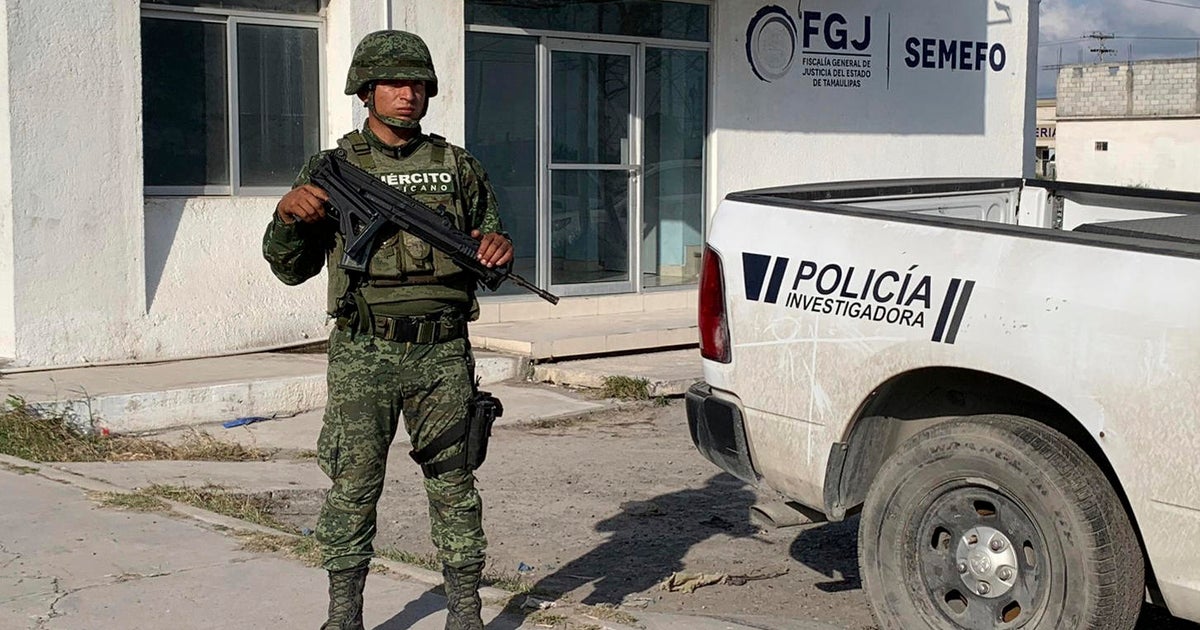"Leave me in a cell": The desperate pleas of asylum seekers inside El Paso's immigration court
This story is the first installment in a three-part series on the Trump administration's controversial "Remain in Mexico" program and its impact on thousands of asylum-seeking families. Read parts two and three here.
El Paso, Texas — Like most of the other migrants seeking asylum in court that day, Ana, a young indigenous woman from Guatemala's western highlands, sat alone at the defendant's desk, without a lawyer at her side.
Soon after she took her seat in one of the small, cold courtrooms in the seventh floor immigration court in downtown El Paso, the visibly distressed asylum seeker from Guatemala begged the presiding judge in her fast-moving, fragmented Spanish not to return her to Mexico.
"Leave me in a cell, please. Leave me in a cell," she told Judge Nathan Herbert, who listened to her plea through a court translator.
Ana was referring to a detention cell in a Border Patrol station in the U.S., where migrants like her — who cross the southern border illegally to seek asylum but otherwise don't have criminal records — are typically detained for a few days or weeks, and then released with a notice to appear in court.
But under a controversial policy known as "Remain in Mexico," the Trump administration has been requiring tens of thousands of migrants who seek asylum near El Paso and other highly transited parts of the southwestern border to wait in Mexico while their cases are processed in the U.S.
The program, which the administration is expanding across the entire border, is officially called the Migrant Protection Protocols (MPP).
But interviews CBS News conducted in El Paso in late July with migrants, advocates and attorneys — along with courtroom testimony from more than a dozen asylum seekers — depict a different policy.
Their accounts paint a picture of a program that places often vulnerable migrants, including families with small children and single women, in precarious situations in Mexico, where the chances of securing legal counsel are slim.
Herbert, one of four immigration judges in El Paso, has been hearing the testimony of these asylum seekers on a weekly basis since "Remain in Mexico" was first implemented in the El Paso sector in March.
During her second hearing in late July, Ana reiterated to Herbert that she feared going back to the city across the border, Ciudad Juárez, one of the most dangerous communities in Mexico and the Western Hemisphere.
"In Mexico, nobody wants to help me," Ana said, adding later, "What hurts me the most is that no one wants to help me."
Herbert told Ana there was little he could do to remove her from the MPP program. But he asked the Department of Homeland Security lawyer in the room to refer the Guatemalan migrant to a so-called non-refoulement interview, offered when asylum seekers express fear about returning to the country that the government seeks to send them to.
The judge does this every time asylum seekers in his courtroom express fear of returning to Mexico. The interviews they go through after court are purportedly designed to ensure migrants are not returned by the government to places where they may face persecution — a longstanding standard in U.S. and international refugee law.
But advocates, attorneys and even some of the asylum officers conducting these non-refoulement interviews say it is almost impossible to satisfy the stringent requirements for the government to allow fearful migrants to stay in the U.S.
When Herbert informed Ana of the interview referral, she noted it would be her second one. "When I came to my first appointment, I said I was afraid of going back to Mexico and they still sent me back to Mexico," she told Herbert.
Midway through her hearing, Herbert realized that Spanish was not Ana's best language, as she initially indicated. She told him her native tongue was Q'anjob'al, a language of Mayan origins spoken primarily in western Guatemala.
After the judge told her he would get an interpreter through the phone, and struggled for a several minutes to find one, Ana, discernibly anxious, said she could continue in Spanish, seemingly worried a delay could jeopardize her case. She told Herbert she learned more Spanish while in Mexico.
But the Q'anjob'al interpreter was eventually found and through him, Herbert told Ana he could give her more time to find an attorney. She again told him she's been trying for weeks to find one to no avail.
"Is there any attorney who can help me?" she asked Herbert, this time in Q'anjob'al.
"The government cannot provide you with an attorney," the judge replied, offering her instead a paper list of legal organizations in the El Paso area.
Immigrants and migrants in the U.S. immigration court system — which is a branch of the Justice Department — do not have the right to a government-appointed lawyer if they can't afford counsel, unlike the independent judicial system.
Towards the end of the hearing with Ana, Herbert said it was of paramount importance for her to show up to her next court date because she could be ordered deported — even if she was technically living in Mexico — "in absentia." Along with nullifying her asylum claim, a deportation order also usually entails a multi-year ban from entering the U.S.
The sole mention of "deportation" rattled Ana.
"I'm pleading with you to help me," she said minutes before the next asylum seeker on the docket was escorted inside the courtroom. "Help me."
"I'm afraid to go back to Mexico. Will I be sent back?"
On the sweltering hot July day of Ana's hearing, about 18 other asylum seekers in the "Remain in Mexico" program — the majority families with small children — were brought to the El Paso immigration court.
The group of migrants, like thousands of others subject to the policy, are temporarily allowed to enter the U.S. to attend their court hearings. They enter through one of the ports of entry that connect El Paso and Ciudad Juárez, where most of them stay in shelters run by community organizers and the local Catholic church.
From there, they are escorted by DHS-contracted security guards, who keep the migrants under tight scrutiny, even when they use the restroom. Before noon, after most of the cases for migrant children are heard by another judge, the guards effectively take control of the 7th floor, placing the MPP program asylum seekers in the small waiting room and restricting access to them by blocking entry into the court until their hearings start.
In the waiting room, filled with several maroon-colored chairs, the adult migrants and their children eagerly and quickly eat their lunch — a selection of snacks from the building's vending machines — as about a dozen guards stand watch.
Unlike the migrant children in the morning hearings, who are represented by attorneys from the Diocesan Migrant and Refugee Services, most families and single adults in the MPP docket do not have counsel.
According to Syracuse University's Transactional Records Access Clearinghouse center, only 1.3% of the nearly 13,000 migrants in the "Remain in Mexico" program had legal representation as of June.
During Ana's day in court, only three families and individuals were represented by attorneys.
One was a family that was absent from the courtroom. After months of waiting in Mexico, the family had given up on its asylum case and returned to Honduras. The family's lawyer was in court to prove they had voluntarily returned to Honduras.
The family's time in Ciudad Juárez, the lawyer said, was "untenable," and she wanted to ensure they did not receive a 10-year ban on entering the U.S.
For the migrants who were not represented, their hearings were strikingly similar.
One mother, who came to court in crutches, told the judge she, her husband and young son were frightened about returning to Ciudad Juárez, where she said she was assaulted.
Herbert's responses to the pleas of migrants in his courtroom — who were convinced he wielded the categorical power to take them out of the "Remain in Mexico" program and allow them to stay in the U.S. — were nearly identical.
"I don't have the authority to let you stay here," the judge told one young father who came to court with his 3-year-old son.
"I don't have the authority to take you out of this program," he told one family after the father said they feared being returned to Mexico and wanted to stay in El Paso.
"I have no control over that process," Herbert said when another father, who sat alongside his wife and 4-year-old son, asked, "I'm afraid to go back to Mexico. Will I be sent back?"
For most cases on that July day, Herbert gave the migrants more time to find counsel, even after nearly all told him their efforts to do so in Mexico had been futile. A few, citing growing desperation, opted to represent themselves — a move immigration attorneys say usually dooms asylum claims in a byzantine immigration system.
Those who claimed they feared returning to Mexico — nearly all — were referred to complete the non-refoulement interview. But most were likely returned to Mexico.
"Magnets for kidnappers"
Taylor Levy, an independent lawyer in the El Paso area who does not represent those returned under MPP but actively works to help and guide them, said there's "roughly a 1%" chance of "winning" the non-refoulement interview.
Because of this, she said most migrants are stranded in Mexican border cities like Ciudad Juárez for months, where they struggle to find shelter and employment, with some facing persecution and extortion.
Some, Levy noted, choose to go home. "You have people get so desperate that they have decided to go home instead of remaining in Mexico, where they're just in so much danger."
"I keep thinking if it was my kids. I wouldn't want them in the shelters. And I work in the shelters a lot. I go there all the time. And the shelters are run by wonderful, loving, caring people," she added, referring to the shelters in Juárez. "But if it was my kids, I'd want them as far as humanly possible away from the shelters, because the shelters are targets — they're magnets for kidnappers."
Others attempt to cross illegally for a second time or for the first time if they first claimed asylum at a port of entry. Late last month, a 20-year-old Guatemalan woman drowned trying to re-enter the U.S. after she had been sent to Mexico under the MPP program.
Because of the dangers faced by these migrants in Mexico, Levy said the deterrence effect she believes underpins the policy has been working.
"In that sense, yes, I think it's been effective in violating people's rights and forcing them into such a dire situation that they give up their lawful claims," she said.
The Trump administration seems to agree, with acting U.S. Citizenship and Immigration Services director Ken Cuccinelli recently bragging about the "spectacular success" of the policy. When announcing the second consecutive drop in apprehensions at the southern border during July, Customs and Border Protection (CBP) denied it was mainly a result of the summer heat, instead pointing to Mexico's amped up enforcement and the MPP program.
What concerns Levy the most is that she believes many Americans consider the "Remain in Mexico" policy "innocuous."
"It feels like such not a big deal to people, you know, it's like, 'Uh, that seems fair, they wait their turn,'" she said. "But that's just quite simply not how it plays out on the ground."
Editor's note: The names of migrants featured in this series have been omitted because they currently have ongoing cases in immigration court.








